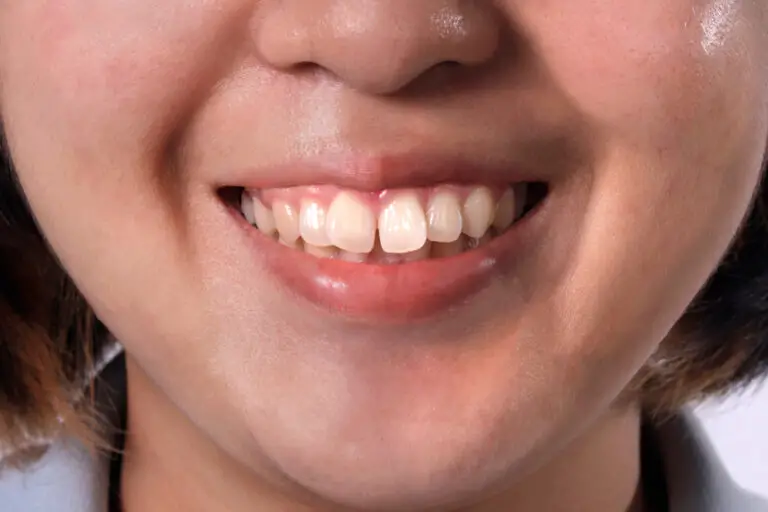What is tooth sensitivity?
Tooth sensitivity, also known as dentin hypersensitivity, is a common dental condition characterized by sharp pain or discomfort in the teeth when exposed to certain triggers, such as hot, cold, sweet, or acidic foods and drinks. It occurs when the dentin layer of the teeth loses its protective covering, exposing the nerve endings underneath. The exposed nerves are then stimulated by external stimuli, causing unpleasant sensations.
Tooth sensitivity is estimated to affect up to 57% of adults worldwide to varying degrees of severity. It can significantly impact a person’s quality of life by causing pain and discomfort while eating and drinking. Identifying the causes and using the right treatments can help manage and prevent sensitivity.
What causes tooth sensitivity?

There are several potential causes of tooth sensitivity:
- Gum recession: When the gums recede due to periodontal disease, aggressive brushing, or other factors, it exposes the root surface and dentin of the teeth. This allows external stimuli to reach the nerves more easily.
- Worn enamel: Over time, tooth enamel can become thinner from acidic foods, abrasive brushing, and grinding of the teeth. This erodes the enamel layer and exposes the sensitive dentin.
- Dental procedures: Treatments like teeth whitening and orthodontics can make teeth more sensitive temporarily by irritating the dentin layer.
- Tooth cracks or chips: Cracks or fractures in the teeth can allow irritants inside the teeth to reach the nerves.
- Teeth grinding: Grinding or clenching of teeth wears down the enamel over time.
- Gastroesophageal reflux disease (GERD): Stomach acid from GERD can erode tooth enamel.
- Age: As people age, gums may naturally recede, and enamel can become thinner, making teeth more sensitive.
What is Sensodyne and how does it work?
Sensodyne is a brand of toothpaste specifically formulated to treat and prevent tooth sensitivity. It contains active ingredients called salts of stannous fluoride or potassium nitrate that work to reduce nerve sensitivity:
- Stannous fluoride – This helps form a protective barrier over the exposed dentin tubules. It binds to the surface and seals the openings of the tubules, preventing stimuli from reaching the nerves.
- Potassium nitrate – This helps desensitize the nerves by interfering with the transmission of pain signals to the brain. It calms and stabilizes the nerve activity.
Some Sensodyne toothpastes also contain fluoride to help strengthen enamel and prevent cavities. The brand offers different product lines with varying active ingredients to provide relief from sensitivity triggered by different causes.
Does Sensodyne work for tooth sensitivity?

Numerous clinical studies show that Sensodyne is effective in reducing tooth sensitivity, especially when used twice daily for at least 2-4 weeks consistently:
- A systematic review of 39 studies found consistent evidence that toothpastes with potassium salts like Sensodyne can significantly improve dentin hypersensitivity compared to regular fluoride toothpastes.
- A double-blind study published in the Journal of Clinical Dentistry compared the desensitizing efficacy of a 5% potassium nitrate Sensodyne toothpaste to regular fluoride toothpaste after 8 weeks of use. The Sensodyne group had significantly reduced sensitivity to cold air, tactile stimulation, and air blasts compared to the regular toothpaste group.
- A 12-week clinical study in the Journal of the American Dental Association had 214 patients with dentin hypersensitivity use a 5% potassium nitrate Sensodyne toothpaste twice daily. By week 8, mean sensitivity scores had decreased by 30%, and by week 12, scores decreased by 43%.
- In a study in the Journal of Contemporary Dental Practice, patients using a Sensodyne Repair & Protect toothpaste with stannous fluoride showed a 69% reduction in sensitivity after 4 weeks compared to just 39% reduction in the control group using regular fluoride toothpaste.
| Clinical study | Main findings |
|---|---|
| Systematic review of 39 studies | Potassium salts in Sensodyne significantly improved dentin hypersensitivity compared to regular fluoride toothpaste |
| Double-blind study in Journal of Clinical Dentistry | Sensodyne group had significantly reduced sensitivity to cold, touch, and air compared to regular fluoride toothpaste after 8 weeks |
| 12-week study in Journal of American Dental Association | Mean dentin sensitivity decreased by 30% at week 8 and 43% at week 12 using daily Sensodyne |
| Study in Journal of Contemporary Dental Practice | 69% sensitivity reduction after 4 weeks using Sensodyne Repair & Protect vs. 39% with regular fluoride toothpaste |
Tips for using Sensodyne effectively
- Use Sensodyne toothpaste twice daily, such as after breakfast and before bedtime. Consistent daily use provides better reduction in sensitivity.
- Brush gently in small circles for at least 2 minutes to allow the active ingredients to work. Harsh brushing can worsen sensitivity.
- Spit out after brushing but avoid rinsing with water right away so the toothpaste stays on the teeth longer.
- Use a soft-bristled brush to avoid enamel wear. Change your brush every 3-4 months.
- Continue using Sensodyne for 2-4 weeks to see full results. It may take several weeks for the nerves to calm down.
- Avoid foods and drinks that irritate sensitive teeth during treatment.
- See your dentist regularly to identify and treat the underlying cause of sensitivity for prolonged relief.
Sensodyne side effects and precautions

Sensodyne toothpaste is generally well-tolerated with minimal side effects in most people when used as directed. However, a few precautions are advised:
- Stannous fluoride has been associated with surface staining in some users, especially with prolonged use. This is usually superficial and can be removed by a dentist.
- Those allergic to stannous fluoride should avoid products containing it. Seek medical care if severe allergic symptoms occur.
- Potassium nitrate formulations are safer for long-term use with minimal risk of complications.
- Children under 12 years should use only under dentist supervision.
- Pregnant women should consult their dentist before using any desensitizing toothpaste.
- Contact your dentist if tooth sensitivity worsens or persists after several weeks of continued use.
When to see a dentist about tooth sensitivity
While Sensodyne can provide relief for many, it’s important to see a dentist if you experience:
- Severe, recurring, or worsening tooth sensitivity not improving with Sensodyne
- Sensitivity accompanied by dental pain, swelling, or other worrisome symptoms
- Sensitivity persisting for more than 4-6 weeks despite proper use of desensitizing toothpaste
- Underlying conditions like teeth grinding/erosion, gum disease, cavities, or tooth fractures
The dentist can properly diagnose the specific cause of sensitivity and provide appropriate treatment, which may include:
- Dental cleaning to remove plaque and tartar irritating the gums
- Gum grafting to cover exposed root surfaces
- Dental restorations like fillings and crowns to cover cracks and defects
- Nightguards and bite splints for teeth grinding
- Fluoride treatment to strengthen enamel
- Root canal therapy if the nerve is severely inflamed/damaged
Frequently Asked Questions about Sensodyne
1. How long does it take for Sensodyne to work?
It can take 2-4 weeks of consistent twice daily use to see noticeable improvement in tooth sensitivity when using Sensodyne. Maximum results are usually seen after about 4-6 weeks. However, some people may respond faster or slower.
2. Is Sensodyne safe for daily long-term use?
Yes, regular daily use of Sensodyne toothpaste is generally safe long-term when used as directed. Stannous fluoride formulations carry a small risk of tooth staining with prolonged use. Peroxide whitening toothpastes can help remove stains.
3. Does Sensodyne help with temperature sensitivity?
Yes, Sensodyne is clinically proven to reduce sensitivity to hot, cold, and chilled foods and drinks. The active ingredients work by calming the nerve response to temperature stimuli.
4. Why do my teeth still hurt when I drink something cold after using Sensodyne?
It can take several weeks of consistent use for Sensodyne to fully control temperature triggered pains. Avoiding very hot or cold foods/drinks during the initial treatment period can help reduce discomfort. Persistent sensitivity may require professional dental treatment.
5. Is Sensodyne suitable for sensitive teeth during pregnancy?
Pregnant women should consult their dentist before using any desensitizing toothpaste, including Sensodyne. The dentist can advise the best formulations and precautions for using during pregnancy and breastfeeding.
The bottom line
Sensodyne toothpaste contains clinically proven active ingredients like stannous fluoride and potassium nitrate that can effectively treat and prevent tooth sensitivity when used correctly. It works by sealing the microscopic tubules in the dentin and calming nerve activity to external stimuli. Consistent daily use for several weeks provides the best reduction in sensitivity. While generally safe, see a dentist for any severe or persistent tooth sensitivity not improving with Sensodyne. Professional treatment may be needed to address the underlying cause. When incorporated into a good oral hygiene routine, Sensodyne can provide sensitivity relief and improve dental comfort.






